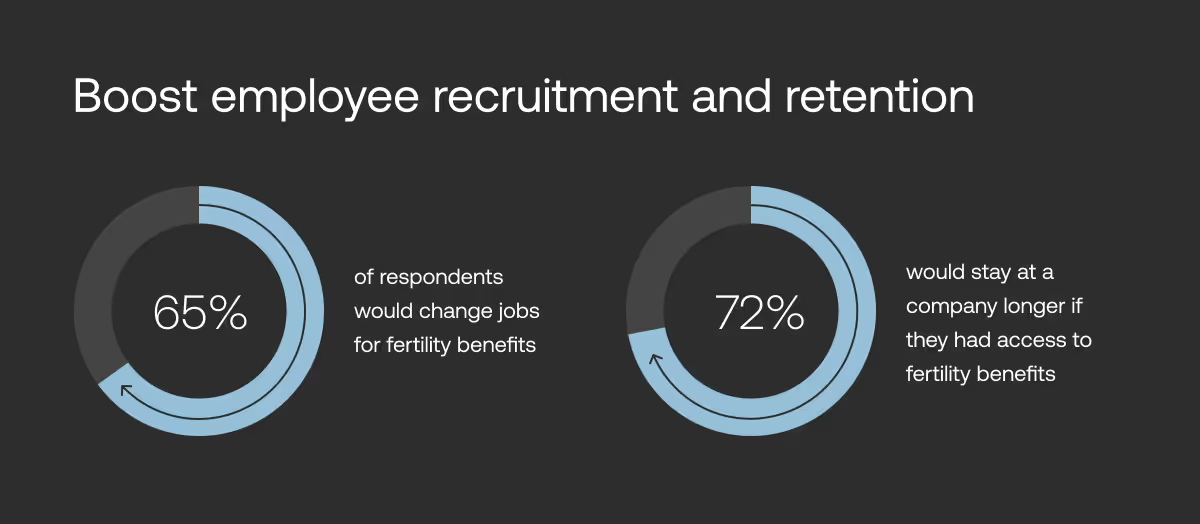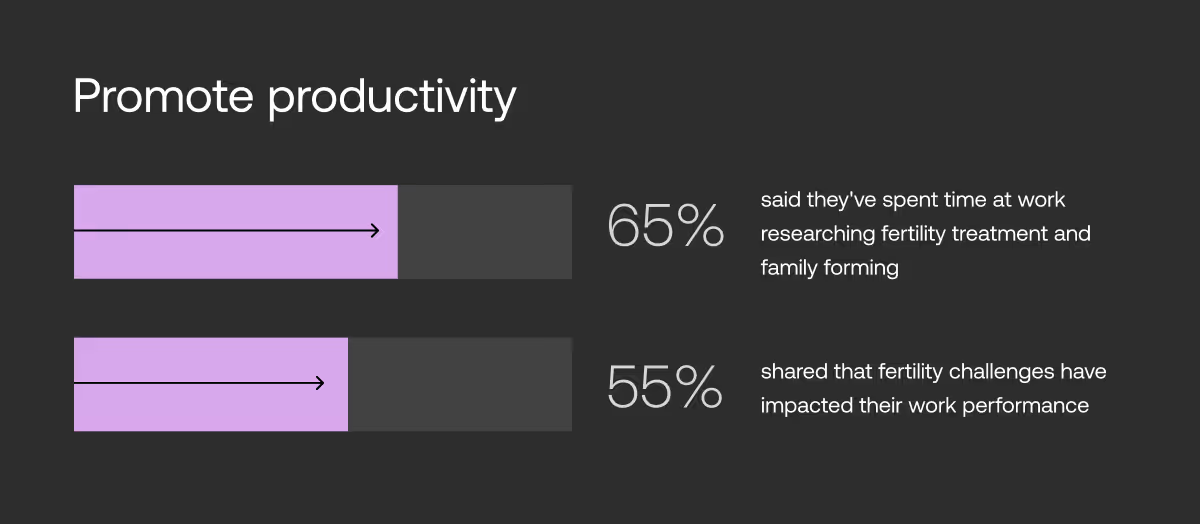The “great resignation” that began in April 2021 changed what employees look for from their employers. Even as the number of quits has decreased over the course of 2023, employees continue to value workplaces that respect and support their personal lives. According to a 2023 LinkedIn survey on talent drivers, employees listed “work–life balance” as a top priority when looking for jobs, second to compensation.
This shift in focus is one reason fertility benefits have become increasingly popular over the last several years — and why they remain a powerful tool for employee recruitment and retention. In fact, more than 60% of employees believe that they should have better fertility benefits in the workplace, creating a unique opportunity for employers to meet employee needs. And meeting those needs can be life changing.
Receiving financial and logistical support for journeys like egg freezing, in vitro fertilization (IVF), and other family-forming options, such as gestational surrogacy and adoption, can make the difference between whether someone goes into debt to form their family or, in some cases, whether they are able to take the next step at all.
How fertility benefits attract and retain employees
Around 12 in every 100 couples in the U.S. will need to seek some sort of fertility treatment to become pregnant. Most of these treatments, such as IVF and donor-assisted reproduction, are not covered by insurance plans except under certain medical circumstances. One cycle of IVF costs around $21,600 and the average person will need to undergo two or three IVF cycles. This means that a person can spend $50,000 on fertility treatments. To pay for IVF, close to 70% of people who go through IVF will go into debt to do so. A gap in access also exists for members of the LGBTQ+ community, who are more likely to pursue adoption or donor-assisted reproduction to grow their families but rarely receive coverage from insurance to pursue these options.
Financial savings improve employee retention and attract top talent
The significant financial impact of fertility treatments helps explain why — in Carrot’s Global Fertility at Work survey, 65% of respondents would change jobs for fertility benefits, and 72% would stay at a company longer if they had access to fertility benefits. Overall, 95% of Carrot members said they would stay longer at their company because of Carrot.

Fertility benefits mean a lot to those who have access to them, but not many people do: only 12% of employees have fertility-specific benefits at work. When it comes to treatment options beyond IVF, that number gets even smaller. That means offering inclusive fertility benefits that cover all paths to parenthood can help your company stand out for covering more than just fertility treatments like IVF.
“It’s truly a great recruiting and retention tool that has set Samsara apart from a lot of companies, and we are proud of that,” said Tanner Brunsdale, Manager of Benefits and HR Operations at Samsara, told Carrot. In a survey, 100% of Samsara employees said they were more likely to stay at the company because of Carrot.
In addition to being expensive, fertility treatments and family-forming journeys, such as adoption, are also logistically challenging and can contribute to presenteeism. Employees may need to miss work and spend time during the day figuring out their next steps, anything from finding clinics and agencies to attending appointments. Sixty-five percent of employees pursuing family forming admit to researching their options during the workday, and 55% share that fertility challenges have detrimentally impacted their work performance.

Fertility benefits that provide care coordination can help employees save time on research by identifying high-quality clinics and agencies, simplifying appointment bookings, and guiding them toward their next steps.
How fertility benefits support remote workers
The promise of permanent remote work is another tool employers are using to recruit and retain employees. The rise in remote work and the subsequent housing market boom have led some employees to find permanent homes in more rural areas dubbed “Zoom towns.” While small towns typically offer more affordable housing and more space, they’re also less likely to have as much access to healthcare services compared to larger metropolitan areas. Fertility benefits can support remote workers — if there are enough resources for them in their areas. Make sure your fertility benefit’s network of clinics and partners covers all parts of the country and the world where your employees live. Including telehealth options also helps support remote workers in areas with more limited access to healthcare.
Reflecting your company’s values in your benefits offerings
In addition to more inclusive hiring strategies, 40% of employers offer fertility benefits. In a market where job seekers and employees care about the values of their employer more than ever, fertility and family-forming benefits can be an integral initiative that makes employees feel that their personal lives are supported as much as their professional lives.
“Having Carrot through my employer makes me feel like our voices are being heard and that leadership values the things that we value. Family and home life are an integral part of a great company and organization,” said Scott, a Carrot member who used his benefits to support him and his wife’s IVF journey.
Job seekers and employees are thinking about how they want their jobs to fit into the rest of their lives and whether their employers understand, respect, and value their employees outside of work.













